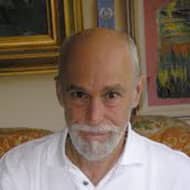Yet, to reiterate a primary impasse of Western science, the subjective is ruled out, and with it morality, not to mention compassion. For example, if Dr. Carl Djerassi had even once taken morality into account, he'd never have been able to invent "The Pill" for birth control. Perhaps this blind impartiality of Western science has given science a bad name. Think of ecocide, for example: science polluting the web of life with which we're interwoven -- the earth, the air, the waters. Or think of the mushroom cloud of Dr. Oppenheimer's crowning achievement: the atomic bomb.
Nondual truth applied to inner space as well as outer
In the wake of quantum physics changing the game, another decisive moment in shifting the terms of Western science came in the opening up of the new multidisciplinary field known as cognitive science, itself a Swiss army knife of related skill sets. Consider, for instance, how quickly a deer must react to a threat such as a saber tooth tiger. If successful, the adrenalin leaves just as quickly. Not so, we're discovering, for the human species. We continue to react long after the stimulus is no longer present. We pump adrenaline long after an actual (or perceived) threat is gone.
In this we find an origin of what's commonly called "stress," as well as prolonged spells of depression. This corroborates the Buddha's teaching as to the nature of needless suffering. As joggers all know, "Pain is inevitable; suffering is extra." Yet we still find ourselves driving the wrong way on a one-way street, and wondering why things aren't going particularly well today.
Cognitive science, like Buddhism, is an art of awakening to What Is. And yet cognitive science as we know it today wouldn't be possible had it not introduced the subjective into the equation. A turning point came when Dr. Herbert smuggled Eastern meditators into his university lab, surreptitiously, under cover of night, to eventually come up with the verifiable "relaxation response." (Certain breathing techniques and mental exercises can stimulate the vagus nerve, and other aspects of our nervous system, to produce a state of less stress and greater calm.)
Meditation can thus be seen as a science and a technology. It can have demonstrable, empirically provable positive effects on human physiology. But, again, to be able to even say this required testimony from the still-shunned realm of the subjective to enter into the discourse. Indeed, one radical, and transformative, aspect of Buddhism is its real-time, first-person, and compassionate empiricism. As the Buddhist motto enjoins, "Ehipassiko: see for yourself!"
No matter, never mind; no mind, never matter
Besides reuniting the inner and the outer, and the subjective and objective, the teachings of the Buddha are healing science's view of mind and matter. Western science is an arena of studying matter, stuff, quantity -- and matter in relation to other matter. It's interesting to note how, if a scientist changes the spin of one electron, the spin of another distant electron seems to instantly change, faster than the speed of light. How to explain that?
Along with the vision of our universe as a net of infinite interaction ("interbeing"), another spiritual recognition present in Buddhism is the nonmaterial, as well the material. (You can't have one without the other.) So there's relationship of non-material facts (such as mind) to other non-material facts (such as mind), as well as to material facts (brain waves, heart rate, etc.), and matter to matter. Scientifically, it might be called "nonlocal phenomena," but a common example is what religion has known since the dawn of time. It's called prayer. Dr. Larry Dossey has documented numerous scientific studies (randomized, double-blind, placebo-controlled) producing evidence that showed that when people were prayed for their health improved.
Conclusions
Consider the game-changers of science. Where what had been considered the fixity of self, Freud spoke of its strata and its provisional nature. (So did Buddha.) Where human life on earth was seen as the predestined apex of a hierarchical pyramid, Darwin opened the door to an understanding of the unpremeditated, emergent properties of living systems. (In his way, so did the Buddha.) And just as the Buddha spoke of form (matter) being no different than the energy of the universe, Einstein did the math, so to speak, and came up with a formula: E=MC2
Is Buddhism a science? As noted, it may depend on what you call science. For one more final example, if we've taken a second-order level of phenomena to be primary, thus excluding all kinds of other instances, then we fail to realize facts as theories themselves. Yet that's what our science tends to do in its primacy of quantity, objectivity, dualism, etc.
To divorce science from the reality of the human being as an incredibly sensitive, complex instrument is to run the risk of getting quite lost in a labyrinth of labels and tags, data from view-finders without perspective. Is Buddhism science? Yes; if we don't rule out the compassionate view of our embeddedness in life, then it's most definitely a supreme science.
For further reading visit The Mind and Life Institute, a vital hub of ongoing dialogue between exciting scientific breakthroughs and Buddhist scholars, headed by HH the Dalai Lama.
Gary Gach manages the Buddhist portal at Patheos. He is also the author of The Complete Idiot's Guide to Buddhism, editor of What Book!?: Buddha Poems from Beat to Hiphop, and translator of three books by the Korean Buddhist poet Ko Un.





